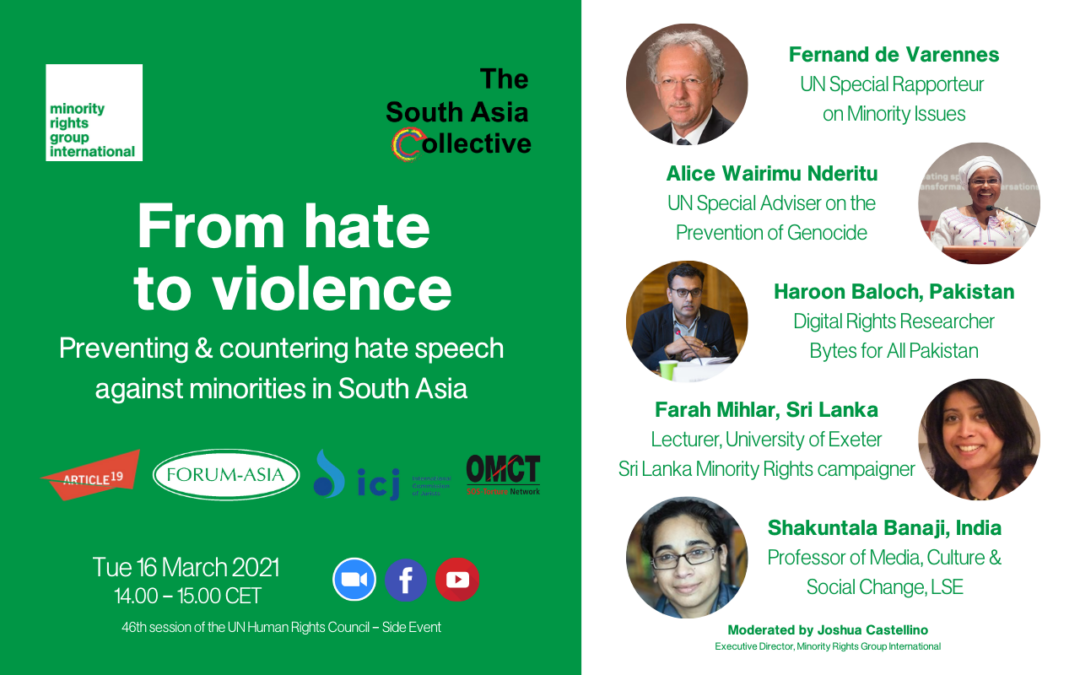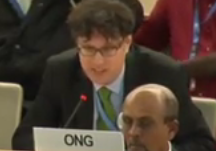
Mar 16, 2021 | Advocacy
This side event will take place on Tuesday 16 March 2021, from 14:00-15:00 (CET) at the 46th session of the UN Human Rights Council. For registration: https://bit.ly/3llCCMF
Minority Rights Group International and South Asia Collective, along with ICJ, OMCT, Article 19 and FORUM-ASIA, are hosting a side event at 46th session of the Human Rights Council, on hate speech and incitement in South Asia. The aim is to instigate discussion on the causes and consequences of hate speech in South Asia, in the hope of encouraging UN and its agencies to engage better on preventive and early warning actions in the region.
Speakers
- Fernand de Varennes – UN Special Rapporteur on Minority Issues
- Alice Wairimu Nderitu – UN Special Advisor on the Prevention of Genocide
- Haroon Baloch, Pakistan – Digital Rights Researcher, Bytes for All Pakistan
- Farah Mihlar, Srilanka – Lecturer, University of Exeter; Srilanka Minority Rights campaigner
- Shakuntala Banaji, India – Professor of Media, Culture and Social Change at London School of Economics
Moderator
- Joshua Castellino – Executive Director, Minority Rights Group International

Feb 28, 2020 | Advocacy, Cases, Legal submissions
The ICJ has intervened with an expert opinion to support the board members of the Turkish Medial Association in the appeal against their conviction for hate speech offences. The conviction raises significant concerns for freedom of expression.
The case before the Appeal Court concerns 11 defendants, all members of the Council of the Turkish Medical Association: Mehmet Raşit Tükel, Taner Gören, Sinan Adıyaman, Mehmet Sezai Berber, Selma Güngör, Bülent Nazım Yılmaz, Funda Barlık Obuz, Dursun Yaşar Ulutaş, Ayfer Horasan, Şeyhmus Gökalp and Hande Arpat.
On 3 May 2019, the defendants were convicted at first instance by the Ankara 32 Assize Court for having issued statements opposing the war during Turkey’s Operation Olive Branch in Syria.
The Assize Court concluded that the members of the Council publicly provoked hatred or hostility in one section of the public against another section which has a different characteristic based on social class, race, religion, sect or regional difference, in a way that creates an explicit and imminent danger to public security. The Court sentenced each defendant to two terms of 10 months’ imprisonment for provoking the public to hatred and hostility in two separate statements.
Hande Arpat was additionally convicted of “disseminating propaganda in support of a terrorist organization” to 18 months and 22 days in prison concerning her three Facebook posts.
The ICJ expert opinion presented before the Court of Appeal examines international law standards relevant to the criminalization and prosecution of crimes of expression.
Turkey-AssDoctors-ExpertOpinion-2020-ENG (download the expert opinion in English)
Turkey-AssDoctors-ExpertOpinion-2020-TUR (download the expert opinion in Turkish)

Mar 19, 2018 | Advocacy, Non-legal submissions
The ICJ spoke at the UN today on concerns about a resurgence of communal violence, and a failure to implement reconciliation and justice mechanisms, in Sri Lanka.
The statement, made during the adoption of the outcome of the Universal Periodic Review for Sri Lanka by the Human Rights Council, read as follows:
“The International Commission of Jurists (ICJ) welcomes the report of the Working Group on the Universal Periodic Review (UPR) on Sri Lanka.
Sri Lanka has stated that it maintains zero tolerance for hate speech and religious violence, and that the National Human Rights Action Plan 2017–2021 contains a firm commitment to enforce section 3(1) of the ICCPR Act. The ICJ further notes that a circular was issued requiring all police officers to take immediate action in this regard. Despite these commitments, recent events demonstrate renewed conflict owing to communal violence directed at the Muslim minority. A state of emergency was proclaimed on 6 March following inaction from law enforcement, and its inability to contain the violence, and emergency regulations were in operation until yesterday.
The ICJ urges the government to demonstrate through action, its willingness bring to account those who have incited communal violence, in line with the ICCPR Act and the commitments conveyed by His Excellency the Ambassador here today. Pervading impunity has emboldened perpetrators to incite violent hatred publicly. Justice must follow recent arrests, ensuring impartial and effective investigations and trials, in line with human rights.
The ICJ also notes the limited progress made on implementing HRC resolution 30/1. Of the reconciliation mechanisms promised, only the Office on Missing Persons is operational. There is little transparency with regards to the other proposed mechanisms (including the mechanism on accountability with involvement of international judges, prosecutors and investigators), or in relation to repeal and replacement of the Prevention of Terrorism Act. Any new counterterrorism law must comply with international human rights standards, and we welcome the Ambassador’s affirmation of the Government’s commitment to this today.
The ICJ urges Sri Lanka to accept and implement all relevant UPR recommendations without delay, before the opportunity for reform may be lost.”
Video of the ICJ statement is available here:
Video of the opening presentation by H.E. the Ambassador of Sri Lanka is available here:







